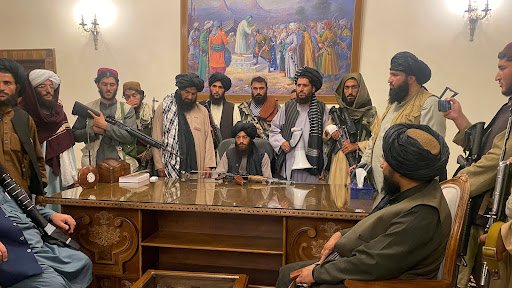Afghanistan Under Taliban Rule
What has changed? What remains the same?

Photo from the New York Times
January 7, 2022
It has been a little over four months since the U.S. withdrew from Afghanistan in dramatic fashion, leaving the Taliban to their own devices. So, what was their next move? It should be noted that the Taliban claimed to the international community that native Afghans who fought against them, whether translators or actual militants, would not be targeted. In a Vice News video report however, reporter Isobel Yeoung found men claiming to be interpreters who had fought against the Taliban in jail, with several broken limbs and a clear lack of food and water. When following up with one of the men’s families, they were able to obtain documents confirming that the man was indeed a translator aiding Canadian task force troops as far back as 2007.
Economically, the new government is in a waiting game with the western powers over frozen funds and aid. The government has shown that it expects a high level of cooperation from western power, though it is very unwilling to make concessions on human rights abuses that the western powers claim are grounds for withholding aid. Among these abuses, the Taliban have detained and beaten journalists and protesters, dissolved any kind of schooling for girls, and in some areas have brought back public executions. While doing so, they have invited the U.S. and other European countries to move their embassies back to Kabul, a request that seems laughable to countries that are withholding aid because of human rights abuses. While western powers are hesitant to engage with the new government, Afghanistan’s eastern neighbors are all incredibly enthusiastic about opening a dialogue. China, Russia and even India have all steadily been increasing their diplomatic relationships with the new government. This has become cause for concern among the western powers, as aid from these nations would squash the need for U.S. aid, further eliminating the hope of diplomacy between the U.S. and the Taliban government.
All the while, on the surface the Taliban is desperately trying to give themselves a friendly name. While Vice’s Isobel Yeoung was in Afghanistan, her government minder sought to show that the quality of life in Kabul was incredibly high, all while carrying an assault rifle around. This was mostly due to the fact that while Yeoung was in Kabul, a mosque was attacked, killing 33 and injuring at least 70. ISIS-K, a group that split off from the Taliban in the early 2010s after viewing the Taliban as too moderate, was responsible for the attack. This attack showed to the international community that this government was not in power as comfortably as they had been showing. Overall, the takeaway from post-war Afghanistan is that, if you supported the Taliban, you are incredibly happy. If you are quite literally anyone else, you are not so happy, and if you are a woman, you no longer can have an education or a job. Despite this, the international community is still inching towards some semblance of diplomacy with this government, but they show no signs of changing the Taliban policies.
https://www.bbc.com/news/world-47391821
https://www.bbc.com/news/world-asia-59368488
https://www.nbcnews.com/news/world/afghanistan-mosque-bombing-leaves-33-dead-73-wounded-rcna3083
